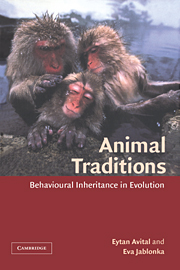Book contents
- Frontmatter
- Contents
- Preface
- Acknowledgements
- 1 New rules for old games
- 2 What is pulling the strings of behaviour?
- 3 Learning and the behavioural inheritance system
- 4 Parental care – the highroad to family traditions
- 5 Achieving harmony between mates — the learning route
- 6 Parents and offspring – too much conflict?
- 7 Alloparental care – an additional channel of information transfer
- 8 The origins and persistence of group legacies
- 9 Darwin meets Lamarck – the co-evolution of genes and learning
- 10 The free phenotype
- References
- Index of species
- Index of subjects
10 - The free phenotype
Published online by Cambridge University Press: 28 October 2009
- Frontmatter
- Contents
- Preface
- Acknowledgements
- 1 New rules for old games
- 2 What is pulling the strings of behaviour?
- 3 Learning and the behavioural inheritance system
- 4 Parental care – the highroad to family traditions
- 5 Achieving harmony between mates — the learning route
- 6 Parents and offspring – too much conflict?
- 7 Alloparental care – an additional channel of information transfer
- 8 The origins and persistence of group legacies
- 9 Darwin meets Lamarck – the co-evolution of genes and learning
- 10 The free phenotype
- References
- Index of species
- Index of subjects
Summary
In The Descent of Man and The Expression of the Emotions in Man and Animals, Darwin argues for evolutionary continuity between the minds of man and higher animals, stressing that higher animals share with us many complex mental capacities:
the difference in mind between man and the higher animals, great as it is, is certainly one of degree and not of kind. We have seen that the senses and intuitions, the various emotions and faculties, such as love, memory, attention, curiosity, imitation, reason, &c., of which man boasts, may be found in an incipient, or even sometimes a well-developed condition, in lower animals.
(Darwin, 1871, p. 105)In one form or another, the continuity thesis is accepted by all evolutionary biologists. Even when a large mental gap between the minds of animals and man is recognised, the interpretation of this gap is based on the assumption that there is an underlying genetic and evolutionary continuity. However, notice how Darwin framed his statement: he did not claim that we are psychologically and cognitively simpler than we believe we are – that we are psychologically more like ‘lower’ animals. On the contrary, Darwin believed that ‘lower’ animals are more complex than is usually thought – that they are more similar to us, possessing more sophisticated capacities than we usually grant them.
In this book, we have followed Darwin's approach, emphasising the learning capacities of higher animals, particularly their ability to learn from others.
- Type
- Chapter
- Information
- Animal TraditionsBehavioural Inheritance in Evolution, pp. 352 - 370Publisher: Cambridge University PressPrint publication year: 2000



